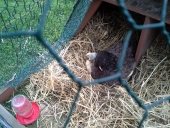
 6
6




 7
7




I make a Maple Syrup instructional movie! Check it out HERE
SKIP books, get 'em while they're hot!!! Skills to Inherit Property
See me in a movie building a massive wood staircase:Low Tech Lab Movie
 7
7




I have found that one reason they shift nest box is when they get up to stretch their legs, some other hen promptly moves in. Because of this risk, I always put my broodies in "protective custody" which could be as simple as a really large dog crate with food and water hanging on the door. Preferably, I use dog exercise pen fencing which is about 4 ft square and put a roof on it. Baby chicks could get through that fencing when they hatch, so I have "baby bumpers" solid material for the lowest foot to 18".Mike Haasl wrote:She'll get off the eggs from time to time to get food, water, dust bath and to stretch her legs. Just keep an eye on things to make sure she goes back to the right nest box. My hens are sometimes very dumb about that...
Visit Redhawk's soil series: https://permies.com/wiki/redhawk-soil
How permies.com works: https://permies.com/wiki/34193/permies-works-links-threads
 6
6




![Filename: unnamed-(10).jpg
Description: [Thumbnail for unnamed-(10).jpg]](/t/211336/a/204031/unnamed-(10).jpg)
Our Destination is Our Legacy
www.peacefulvalleyfold.com
 3
3




This is one of my more recent hens, who decided to brood under a pallet in the barn. I didn't find her until days before she hatched,
My friend does this with her banties but they're much more used to being human handled than most of my birds. I try to avoid it with my Muscovy ducks as they tend to react with "mommy defensive poop" which I *don't* want in the nest! We don't have many chickens that go broody, and if the mom looks like she's well, I try to just be patient and see how things go.I will generally go out and candle all the eggs halfway through just to make sure she's not sitting on any rotten eggs, but that's optional.
Visit Redhawk's soil series: https://permies.com/wiki/redhawk-soil
How permies.com works: https://permies.com/wiki/34193/permies-works-links-threads
 2
2




"When the whole world is running towards a cliff, he who is running in the opposite direction appears to have lost his mind." C.S. Lewis
Visit https://themaineingredient.com for organic, premium dried culinary herbs that are grown, processed, and packaged in the USA.

| I agree. Here's the link: http://stoves2.com |



